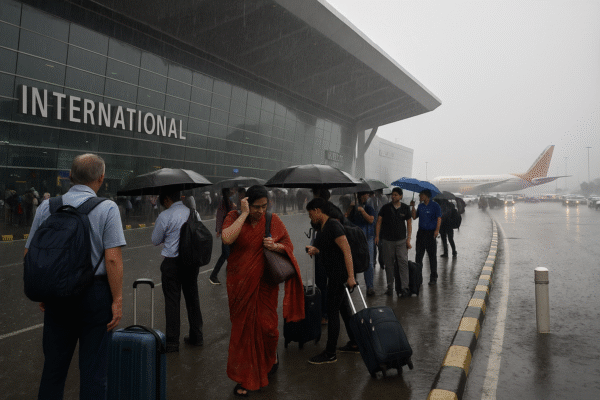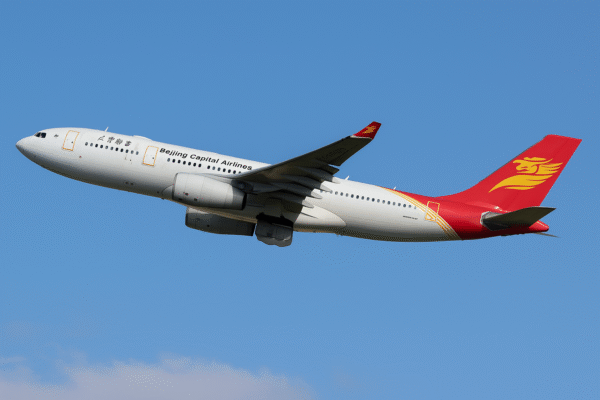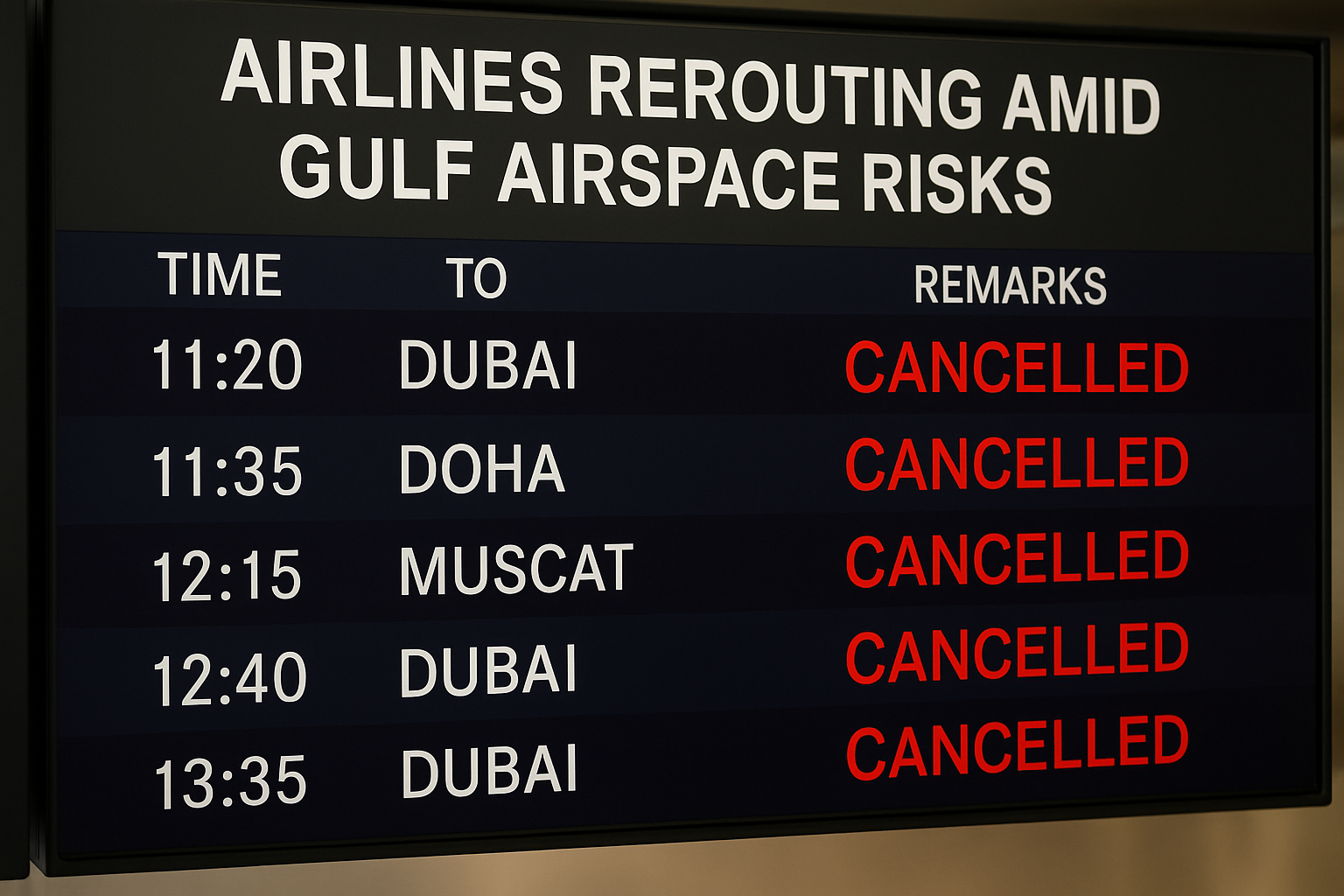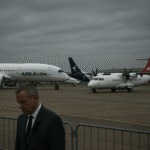The commercial aviation world is facing its most disruptive geopolitical crisis of 2025 as tensions soar in the Persian Gulf following Iran’s threats to close the Strait of Hormuz and strike Western assets. Global airlines—including American, United, Lufthansa, and Singapore Airlines—have swiftly responded by suspending or rerouting flights to destinations across the Gulf.
Airspace over and around Iran, Qatar, the UAE, and Oman is now considered high-risk, triggering cascading cancellations across North America, Europe, and Asia.
American and United Halt Gulf Operations
American Airlines and United Airlines were among the first U.S. carriers to suspend all direct services to Gulf hubs, including Dubai and Doha. The decision follows growing concerns about Tehran’s vow to retaliate against U.S. presence in the region, including threats to close the Strait of Hormuz—a critical commercial and strategic corridor that also supports vital air travel routes.
Both carriers confirmed that travelers would be rebooked on alternate routes or offered refunds and vouchers. With limited detour options and heightened demand, many passengers now face delays or extended travel durations.
Delta, Air Canada, and Singapore Airlines Join Cautionary Pullback
Delta Air Lines and Air Canada soon followed suit, announcing temporary service suspensions to the Gulf, citing safety concerns tied to the evolving security threat. Singapore Airlines also confirmed it is rerouting its long-haul flights between Asia and Europe to avoid Iranian airspace, adding additional fuel stops and increasing flight durations.
Affected travelers connecting through cities like Dubai, Abu Dhabi, and Doha are now being rerouted via safer corridors over Egypt, Turkey, or Central Asia.
Lufthansa and Swiss Suspend All Gulf Flights
Europe’s leading carriers have taken bold action in response to new advisories from the European Union Aviation Safety Agency (EASA). Lufthansa has temporarily suspended services to Dubai, Doha, and Muscat. Swiss International Air Lines has similarly paused all flights to the UAE and continues to reassess routes on a rolling basis.
Lufthansa stated the safety of its crews and passengers is paramount and will reassess service options as the situation evolves. EASA’s latest bulletin classifies Gulf-region airspace as “at risk of potential missile activity,” prompting carriers to proactively adjust schedules.
Air France-KLM and Japan Airlines Implement Emergency Rerouting
Air France-KLM has begun rerouting flights previously scheduled to pass through Iranian-controlled airspace. While the carrier is maintaining limited services to the UAE and Qatar, it has instituted detours that significantly lengthen flights between Europe and Southeast Asia.
Japan Airlines, despite Japan’s historically neutral stance in regional geopolitics, has launched an immediate review of its long-haul flight paths. The airline has started rerouting planes previously traveling across the Gulf, in a move described as “precautionary but necessary.”
Emirates Adjusts Operations; Warns of Delays
Emirates Airline, based in Dubai, has issued operational notices to passengers regarding potential delays and rerouted flights. The airline confirmed it has adjusted long-haul paths to minimize exposure over the Strait of Hormuz and Iranian-adjacent airspace, working closely with international aviation regulators.
Though headquartered in the UAE, Emirates emphasized it is maintaining services with increased caution and real-time route monitoring.
Gulf Governments Trigger Emergency Protocols
The ripple effect of these flight changes has impacted governance across the Gulf. Bahrain announced that over 70% of government staff will temporarily work remotely as part of its emergency protocol. In Qatar, home to the largest U.S. military base in the Middle East, airports are under heightened security alert as airline traffic sharply drops.
Meanwhile, the UAE’s civil aviation authority is in active coordination with global air traffic networks to monitor risk zones and maintain safe corridors where possible.
Strait of Hormuz: A Strategic Flashpoint
Iran’s warning that it could shut down the Strait of Hormuz remains the most serious threat. The strait handles over a third of the world’s seaborne oil transport and also sits beneath one of the busiest East–West aviation highways.
Any closure would severely impact not only regional trade and fuel shipping, but also delay global flight operations—especially those connecting Europe, Asia, and Africa.
The International Civil Aviation Organization (ICAO) has issued urgent safety advisories encouraging carriers to stay updated on airspace risks and avoid volatile regions altogether.
Ticket Prices Surge, Airlines Absorb Losses
As aircraft reroute and extend flight durations, operating costs are surging. Jet fuel consumption is rising, crew hours are increasing, and landing slots at alternative airports are being reconfigured. These costs are likely to translate to higher ticket prices for travelers in coming weeks.
Despite these challenges, many airlines are waiving rebooking fees and offering full refunds or vouchers to support affected passengers.
What Travelers Should Do Now
- Check airline websites for real-time updates on suspended or rerouted flights.
- Monitor government travel advisories, especially from the U.S. Department of State and EASA.
- Rebook early, as limited alternative routes may quickly fill.
- Secure travel insurance that includes geopolitical and cancellation coverage.
- Contact airlines or travel agents for flexible itinerary support.
Conclusion: Aviation Braces for a Prolonged Gulf Crisis
The coordinated global airline response underscores the seriousness of the current aviation crisis in the Gulf. With threats of retaliation, possible cyberattacks, and airspace instability, airlines are left with little choice but to adapt swiftly.
As the Strait of Hormuz hangs in geopolitical limbo, travelers, airlines, and governments alike are bracing for an extended period of uncertainty. For now, the skies over the Gulf remain contested—and commercial aviation is caught in the crosshairs.
For more travel news like this, keep reading Global Travel Wire















